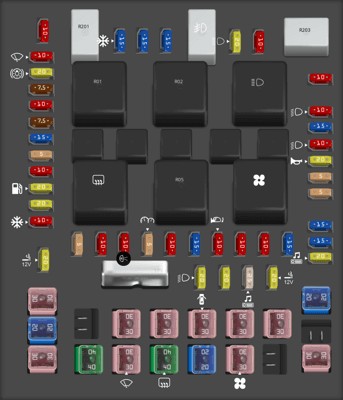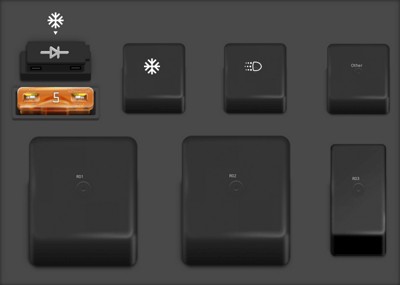Maintaining your 2007 Ford F-150 involves understanding its electrical system, and fuses are a crucial component. When you’re diagnosing issues using an OBD2 scanner, knowing the fuse location for your OBD2 port is essential. This guide will help you locate the OBD2 fuse and understand the fuse box diagrams for your 2007 Ford F-150.
Understanding Fuse Boxes in Your 2007 Ford F-150
Your 2007 Ford F-150 is equipped with multiple fuse boxes, each protecting different circuits within your vehicle. For a comprehensive understanding, you’ll need to be familiar with these locations:
- Passenger Compartment Fuse Panel: Often the primary fuse box for many interior functions, including potentially the OBD2 port.
- Auxiliary Relay Box (with DRL): This box is present in models equipped with Daytime Running Lights (DRL) and houses additional relays and fuses.
- Auxiliary Relay Box (without DRL): For models without Daytime Running Lights, this auxiliary box will have a slightly different configuration.
To help you navigate these locations, here are diagrams and descriptions for each fuse box in your 2007 Ford F-150.
Passenger Compartment Fuse Panel Diagram
The passenger compartment fuse panel is typically located inside the vehicle, often beneath the dashboard on the driver’s side or passenger side. This fuse box controls numerous interior electrical functions. Refer to the diagram below for fuse and relay locations within this panel.
| Type | No. | Description |
|---|---|---|
| Fuse MINI 10A | 1 | Run/Accessory – Wipers, Instrument cluster, Audio for XL/STX |
| Fuse MINI 20A | 2 | Stop/Turn lamps, Brake on/off switch, Hazard flashers |
| Fuse MINI 7.5A | 3 | Power mirrors, Memory seats and pedals, Driver power seat |
| Fuse MINI 10A | 4 | DVD battery power, Power fold mirror |
| Fuse MINI 7.5A | 5 | Keep alive memory for Powertrain Control Module (PCM) and climate control module |
| Fuse MINI 15A | 6 | Parklamps, BSM, Instrument panel illumination |
| Fuse MINI 5A | 7 | Radio (start signal) |
| Fuse MINI 10A | 8 | Heated mirrors, Switch indicator |
| Fuse MINI 20A | 9 | Fuel pump relay, Fuel injectors, Intake manifold runner control [4.2L] |
| Fuse MINI 20A | 10 | Trailer tow back-up lamps relay (PCB1), Trailer tow parklamp relay (R201) |
| Fuse MINI 10A | 11 | A/C clutch, 4×4 solenoid |
| Fuse MINI 5A | 12 | PCM relay coil |
| Fuse MINI 10A | 13 | Climate control module power, Flasher relay |
| Fuse MINI 10A | 14 | Back-up lamp and Daytime Running Lamps (DRL) relay coil, A/C pressure switch, Redundant speed control switch, Heated PCV [5.4L], Trailer tow back-up lamps relay coil, ABS, Reverse park aid, EC mirror, Navigation radio (reverse input) |
| Fuse MINI 5A | 15 | Overdrive cancel, Cluster, Traction control switch |
| Fuse MINI 10A | 16 | Brake-shift interlock solenoid |
| Fuse MINI 15A | 17 | Fog lamp relay (R202) |
| Fuse MINI 10A | 18 | Run/Start feed – Overhead power point, Electrochromatic mirror, Heated seats, BSM, Compass, RSS (Reverse Sensing System) |
| Fuse MINI 10A | 19 | Restraints (Air bag module), OCS |
| Fuse MINI 10A | 20 | Battery feed for overhead power point |
| Fuse MINI 15A | 21 | Cluster keep alive power |
| Fuse MINI 10A | 22 | Delayed accessory power for audio, power door lock switch and moon roof switch illumination |
| Fuse MINI 10A | 23 | RH low beam headlamp |
| Fuse MINI 15A | 24 | Battery saver power for demand lamps |
| Fuse MINI 10A | 25 | LH low beam headlamp |
| Fuse MINI 20A | 26 | Horn relay (PCB3), Horn power |
| Fuse MINI 5A | 27 | Passenger Air bag Deactivation (PAD) warning lamp, Cluster RUN /START power |
| Fuse MINI 5A | 28 | SecuriLock transceiver (PATS), PCM IGN monitor |
| Fuse MINI 15A | 29 | PCM 4×4 power |
| Fuse MINI 15A | 30 | PCM 4×4 power |
| Fuse MINI 20A | 31 | Radio power, Satellite radio module |
| Fuse MINI 15A | 32 | Vapor Management Valve (VMV), A/C clutch relay, Canister vent, Heated Exhaust Gas Oxygen (HEGO) sensors #11 and #21, CMCV, Mass Air Flow (MAF) sensor, VCT, Heated Positive Crankcase Ventilation (PCV) valve [4.2L engine], CID sensor [4.2L engine, 4.6L/4.2L EGR] , Electronic fan clutch [4.6L/5.4L engines] |
| Fuse MINI 15A | 33 | Shift solenoid, CMS #12 and #22, Ignition coils |
| Fuse MINI 15A | 34 | PCM power |
| Fuse MINI 20A | 35 | Instrument cluster high beam indicator, High beam headlamps |
| Fuse MINI 10A | 36 | Trailer tow right turn/stop lamps |
| Fuse MINI 20A | 37 | Rear power point, Center console power point |
| Fuse MINI 25A | 38 | Subwoofer power |
| Fuse MINI 20A | 39 | Instrument panel power point |
| Fuse MINI 20A | 40 | Low beam headlamps, DRL |
| Fuse MINI 20A | 41 | Cigar lighter, Diagnostic connector power |
| Fuse MINI 10A | 42 | Trailer tow left turn/stop lamps |
| Fuse FMX/JCase 30A | 101 | Starter solenoid |
| Fuse FMX/JCase 20A | 102 | Ignition switch feed |
| Fuse FMX/JCase 20A | 103 | ABS valves |
| Fuse FMX/JCase 30A | 105 | Electric trailer brakes |
| Fuse FMX/JCase 30A | 106 | Trailer tow battery charge |
| Fuse FMX/JCase 30A | 107 | Power door locks (BSM) |
| Fuse FMX/JCase 30A | 108 | Passenger power seat |
| Fuse FMX/JCase 30A | 109 | Driver power seat, Adjustable pedals, Memory module (pedals, seat, mirror) |
| Fuse FMX/JCase 30A | 111 | 4×4 relays |
| Fuse FMX/JCase 40A | 112 | ABS pump power |
| Fuse FMX/JCase 30A | 113 | Wipers and washer pump |
| Fuse FMX/JCase 40A | 114 | Heated backlite, Heated mirror power |
| Fuse FMX/JCase 20A | 115 | Not used (Spare) |
| Fuse FMX/JCase 30A | 116 | Blower motor |
| Fuse FMX/JCase 30A | 118 | Heated seats |
| Circuit breaker MAXI | 401 | Delayed accessory power: Power windows, Moon roof, Power sliding backlite (circuit breaker) |
| Relay | R01 | Starter solenoid |
| Relay | R02 | Accessory delay |
| Relay | R03 | Hi-beam headlamps |
| Relay | R04 | Heated backlite |
| Relay | R05 | Trailer tow battery charge |
| Relay | R06 | Blower motor |
| Relay | R201 | Trailer tow park lamps |
| Relay | R202 | Fog lamps |
| Relay | R203 | PCM |



Fuse 41 (20A) in the passenger compartment fuse panel is labeled “Cigar lighter, Diagnostic connector power.” This is very likely the fuse that powers your OBD2 port. If you’re experiencing issues with your OBD2 scanner not powering up, this is the first fuse to check.
Auxiliary Relay Box (with DRL) Diagram
For 2007 Ford F-150 models equipped with Daytime Running Lights (DRL), you’ll find an auxiliary relay box. This box is often located in the engine compartment.
| Type | No. | Description |
|---|---|---|
| Fuse ATO 5A | F03 | Clockspring illumination |
| Relay | R01 | 4×4 CCW |
| Relay | R02 | 4×4 CW |
| Relay | R03 | Daytime Running Lamps (DRL) high beam disable |
| Relay | R201 | (DRL) Daytime running lights |
| Relay | R202 | (A/C clutch) A/C magnetic clutch |
| Diode ATO | D01 | (A/C clutch) A/C magnetic clutch |
Auxiliary Relay Box (without DRL) Diagram
If your 2007 Ford F-150 does not have Daytime Running Lights, the auxiliary relay box configuration will be slightly different. Again, this is typically found in the engine compartment.
| Type | No. | Description |
|---|---|---|
| Fuse ATO 5A | F03 | Clockspring illumination |
| Diode ATO | D01 | A/C clutch |
| Relay | R202 | A/C clutch |
Locating the OBD2 Port Fuse Specifically
While the OBD2 port fuse is generally Fuse 41 in the passenger compartment fuse box, always double-check your owner’s manual for the most accurate location for your specific vehicle. Fuse box diagrams can sometimes vary slightly.
Steps to Locate and Check the OBD2 Fuse:
- Locate the Passenger Compartment Fuse Box: Refer to your owner’s manual for the precise location in your 2007 Ford F-150.
- Find Fuse 41: Using the diagram provided and the markings on the fuse box cover, locate fuse position 41.
- Inspect the Fuse: Carefully remove the fuse. You can usually do this with your fingers or a fuse puller tool (often found in the fuse box itself or your vehicle’s tool kit). Hold the fuse up to the light and check if the thin wire inside is broken or melted. If it is, the fuse is blown.
- Replace if Necessary: If the fuse is blown, replace it with a new 20A MINI fuse. Important: Always use the correct amperage rating for the fuse. Using a fuse with a higher amperage can damage your vehicle’s electrical system.
- Test Your OBD2 Port: After replacing the fuse, try using your OBD2 scanner again to see if it now powers up and connects.
Conclusion
Understanding the fuse box locations and diagrams for your 2007 Ford F-150, especially the OBD2 fuse location, is a valuable skill for any owner. By using this guide, you can quickly diagnose and resolve common electrical issues related to fuses, keeping your truck running smoothly and your diagnostic capabilities online. Remember to always consult your owner’s manual for the most precise information for your specific vehicle.
